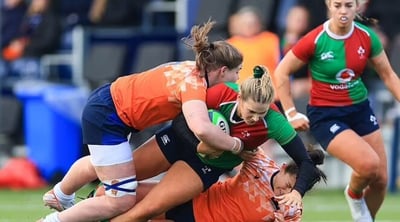Groundbreaking Move: Scotland to Address Gender Differences in Concussion Guidelines
 Scotland is set to become one of the first countries globally to recognize gender differences in concussion protocols with the announcement of new sports guidelines later this month.
Scotland is set to become one of the first countries globally to recognize gender differences in concussion protocols with the announcement of new sports guidelines later this month.
This pioneering move by sportscotland will reference studies identifying variations in risk and recovery between males and females, marking a significant advancement over the current UK-wide guidelines, which do not differentiate between genders. The new guidelines, titled "If In Doubt, Sit Them Out - Scottish Sports Concussion Guidance," have been developed in collaboration with the Scottish Government and various authorities, including Scottish Rugby and the Scottish Football Association.
The new guidelines, titled "If In Doubt, Sit Them Out - Scottish Sports Concussion Guidance," have been developed in collaboration with the Scottish Government and various authorities, including Scottish Rugby and the Scottish Football Association.
This initiative follows increased awareness and debate around female concussion, particularly after the tragic death of former Scotland rugby international, Siobhan Cattigan, who passed away at age 26 following multiple concussions.
Her family believes these injuries led to traumatic brain injuries that significantly altered her behavior.
Neil and Morven Cattigan, Siobhan's parents, recently met with Sports Minister Maree Todd to discuss their concerns. They expressed their support for the new guidelines, stating,
"As Siobhan’s legacy and in her memory, we implore them to instigate female-specific research, guidance, education, and awareness now—not in 10 years' time. We fear that there will be another Siobhan if action is not taken."
The new guidelines will allow women to make informed choices about their participation in sports and aim to enhance the understanding of concussion in females.
Studies, including one led by Professor Willie Stewart from the University of Glasgow, have shown that female athletes are almost twice as likely to suffer from sports-related concussions compared to their male counterparts. These findings underscore the need for gender-specific concussion management.
Dr. Marshall Garrett, who previously commissioned a report on the enhanced risks for female rugby players, welcomed the new guidelines but emphasized the importance of following up with educational initiatives to raise awareness of female-specific concussion issues.
"There is no doubt that there are inherent differences in susceptibility and likelihood of longer symptoms in women, and this needs to be highlighted and acted on where appropriate."
Scotland's new concussion guidelines represent a crucial step towards improving safety and awareness for female athletes, setting a precedent that other nations are expected to follow.
Read the full story from MailOnline Sports here!
![HR Logo [Recovered]_Full Color Vertical-1](https://blog.healthyroster.com/hs-fs/hubfs/HR%20Logo%20%5BRecovered%5D_Full%20Color%20Vertical-1.png?width=199&height=178&name=HR%20Logo%20%5BRecovered%5D_Full%20Color%20Vertical-1.png)
 By
By


